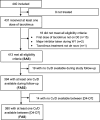Tacrolimus Dose Requirement in De Novo Adult Kidney Transplant Patients Treated With Adoport® Can Be Anticipated
- PMID: 39469664
- PMCID: PMC11513580
- DOI: 10.3389/ti.2024.13495
Tacrolimus Dose Requirement in De Novo Adult Kidney Transplant Patients Treated With Adoport® Can Be Anticipated
Abstract
All the factors potentially influencing tacrolimus dose requirement and combinations thereof have never been thoroughly investigated, precluding accurate prediction of tacrolimus starting dose. This prospective, non-interventional, multicenter study in de novo adult kidney transplant recipients over the first year after transplantation aimed to investigate the factors influencing tacrolimus dose-standardized trough blood concentration (C0/D) over the first week post-transplant (D4-D7, primary objective), D8-M3 and M3-M12 (secondary objectives). Statistical analysis employed mixed linear models with repeated measures. Eighteen sites enrolled 440 patients and followed them up for 9.5 ± 4.1 months. Age at baseline (p = 0.0144), end-stage renal disease (p = 0.0092), CYP3A phenotype (p < 0.0001), dyslipidemia at baseline (p = 0.0031), hematocrit (p = 0.0026), total bilirubin (p = 0.0261) and plasma creatinine (p = 0.0484) independently increased with log(C0/D) over D4-D7, explaining together 72.3% of the interindividual variability, and representing a robust model to estimate tacrolimus initial dose. Donor age and CYP3A phenotype were also influential over D8-M3 and M3-12, in addition to recipient age. Corticosteroids, diabetes at baseline, and ASAT yielded inconstant results between D8-M3 and M3-M12. We found no ethnicity effect when CYP3A phenotype was accounted for, and no food effect. Intra-individual variability over M3-M12 was moderate, and significantly lower in patients with chronic hepatic disorder (p = 0.0196) or cancer (p = 0.0132).
Keywords: diet; ethnicity; genetic polymorphisms; pharmacokinetic variability; tacrolimus.
Copyright © 2024 Marquet, Anglicheau, Humeau, Adrouche, Saada, Bisiaux, Guillemin, Lardy-Cléaud and Rostaing.
Conflict of interest statement
SA and LS are employees of SANDOZ S.A.S, Levallois-Perret, France, which funded the study. JB, SG, and AL-C are employees of RCTs, the contract research organization that conducted the study on behalf of SANDOZ S.A.S. AH is a biostatistician at University Hospital of Limoges, France. PM, DA, and LR received honoraria from SANDOZ S.A.S as members of the study’s independent Scientific Committee. PM is a consultant/medical expert for Astellas, BMS, Chiesi, Exeltis, MedIncell, Pfizer, Siemens and Womed. DA is a consultant/medical expert for Astellas, Astra Zeneca, BMS and Chiesi. LR is a consultant/medical expert for BMS and Sanofi.
Figures
References
-
- Gustavsen MT, Midtvedt K, Robertsen I, Woillard JB, Debord J, Klaasen RA, et al. Fasting Status and Circadian Variation Must Be Considered When Performing AUC-Based Therapeutic Drug Monitoring of Tacrolimus in Renal Transplant Recipients. Clin Transl Sci (2020) 13(6):1327–35. 10.1111/cts.12833 - DOI - PMC - PubMed
-
- Marquet P, Albano L, Woillard JB, Rostaing L, Kamar N, Sakarovitch C, et al. Comparative Clinical Trial of the Variability Factors of the Exposure Indices Used for the Drug Monitoring of Two Tacrolimus Formulations in Kidney Transplant Recipients. Pharmacol Res mars (2018) 129:84–94. 10.1016/j.phrs.2017.12.005 - DOI - PubMed
Publication types
MeSH terms
Substances
LinkOut - more resources
Full Text Sources
Medical



